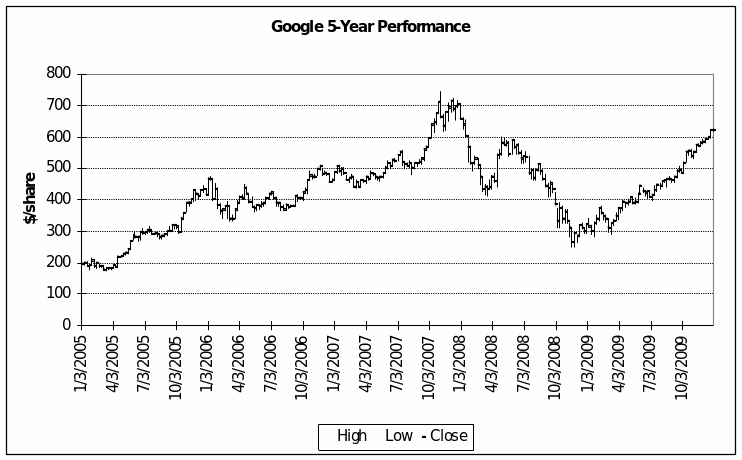In the five years dating back to January 2005, based on the intra-week closing price, Google stock has averaged $428 per share while moving between a wide band of from $178 to as much as $715. This is a good countercyclical choice since, for one, the company closed the third year of the U.S. recession at a shade under $620.

Taking the long view, one continues to be impressed by how well Google has appreciated. Trundling along at less than $200 per share early in the reference period, the stock peaked in late 2007, when the financial services, housing, manufacturing and service sectors already felt the onslaught on the current recession. Dependent on search advertising revenues for an astronomical proportion of net income, Google lagged the rest of the economy in “plummeting” to $262.43 only in mid-November, 14 ½ months after the recession had officially commenced in the third quarter of 2007 and a month after many of the biggest names in Wall Street closed their doors forever, begged for billions in government succor or were bought out by peers in the industry.
Even now, when recession still hangs like a pall over the economy – as evidenced by a mortgage market that remains soft, anemic demand for even gas-sipping Japanese cars, and an unemployment rate that belies the endless litany of rosy overpromise by the White House – Google has gone against the tide by engineering nearly a doubling of stock price between January and December 2009. Were the 93.7% capital appreciation to continue over the near term, an equity futures contract for 100 shares priced at $621.66 on the last trading day before New Year 2010 would net a stunning $58,226.88 by early 2011 on a per-share gain of $582.27.
Expecting the stock to zoom to $1,203.93 in a year’s time may be a pipedream since Google has never breached $747.24 in intra-week highs. And, as shown by the experience of late 2008 and up to the first week of March 2009, this colossus of Internet search is not immune to poor revenue streams from its business-to-business and business-to-consumer advertisers when recession was at its worst. And there is no light yet for this economic malaise afflicting America.
Nonetheless, Google has the capacity to surprise. Even halving that expected growth rate to “only” 96.8% p.a. would be fantastic compared to puny returns from certificates of deposit (hovering around 1.5% p.a. currently), rolling over six-month Treasuries (around 0.19%), or savings deposit rates of 2.0% to 2.25% p.a. The company has huge upside potential owing to the creative ferment and gung-ho strategy that has resulted in such moves as the “Google Apps” suite for businesses, Android for mobile phones and the YouTube acquisition.